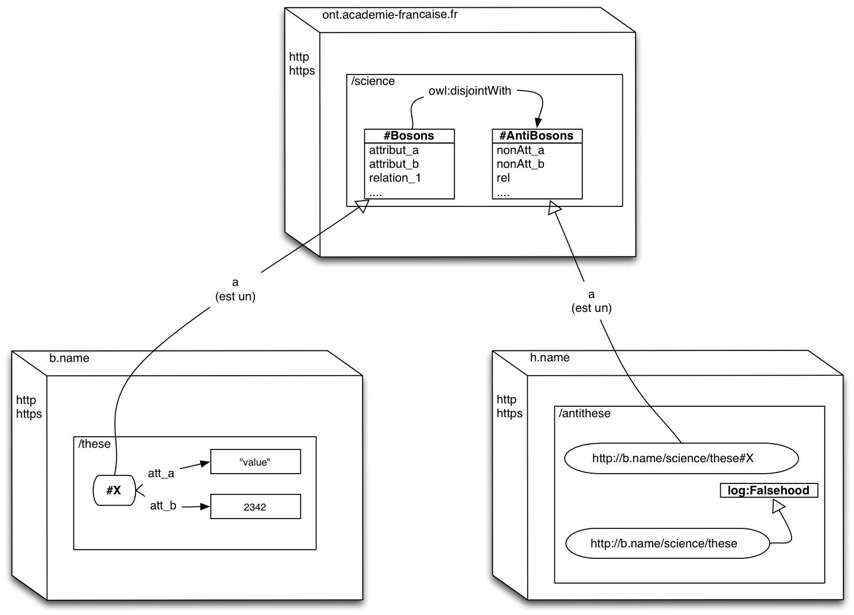- From: <henry.story@bblfish.net>
- Date: Wed, 27 May 2015 06:58:26 +0200
- To: Masinter Larry <masinter@adobe.com>
- Cc: Carvalho Melvin <melvincarvalho@gmail.com>, "public-philoweb@w3.org" <public-philoweb@w3.org>
- Message-Id: <9F05F606-8D4F-4C63-86E3-F7765C83D8C1@bblfish.net>
> On 27 May 2015, at 03:14, Larry Masinter <masinter@adobe.com> wrote:
>
> Missing reference, what is the distinction before “Form” and “forms”?
> But the Semantic Web is a web of utterances by distributed players which are all intrinsically ambiguous and highly likely to be full of contradictions and differences of opinion.
> The main ‘invention’ of the web (and Gopher before it) was the distributed authority of having uncoordinated but linked data resources. A semantic WEB needs the same freedom for different serves to make contradictory assertions… is that what you mean?
I agree.
What has not yet happened is specification of vocabulary for disagreement. Various philosophers in France, including Bernard Stiegler and Bruno Latour, have put a lot of emphasis lately on the importance of controversy.
Even though a controversy could emerge from a pure logical contradiction such as the following example illustrated in the diagram below, where we imaging a well established ontology from a prestigious organisation that creates two disjoint categories of bosons and anti-bosons. Then we can imagine well respected scientists B that classifies an object as a Boson, and yet scientist H that then later classifies the
same object as an Anti-Boson.
As he discovers this difference, H adds that the information on B's </thesis> resource is a falsehood.
This is neither a Like nor a Dislike. It's both in some sense, as controversies can be very fruitful. At the minimum it is a pointer to reasoning engines that they should not merge both graphs.
As is well know in logic everything follows from a contradiction: i.e. no distinctions can be made. And indeed once a contradiction is reached everything can be questions. In this case the controversy could question:
* the ontology
* the statement by any of the scientists, or the procedures they used to reach those statements ( where they referring to the same entity? )
* the logical engines that showed these two as contradictory
* ...
A discussion on each side could bring to bear different points of views on the subject. At the end this could lead to a split of both communities, or a retraction of one of the three of some relation.
Not all controversies need be logical based. Someone could publish a relation such as
<http://dbpedia.org/resource/Muhammad>
<http://xmlns.com/foaf/0.1/depiction>
<https://eagereyes.org/media/2010/empty-frame.jpg <https://eagereyes.org/media/2010/empty-frame.jpg>> .
And that could in certain circles be controversial.
Henry
>
> Larry
> —
> http://larry.masinter.net
>
>
>
> http://masinter.blogspot.com/2014/11/ambiguity-semantic-web-speech-acts.html <http://masinter.blogspot.com/2014/11/ambiguity-semantic-web-speech-acts.html>
>
> On 5/26/15, 1:59 PM, "Melvin Carvalho" <melvincarvalho@gmail.com <mailto:melvincarvalho@gmail.com>> wrote:
>
> I was reading this quote lately:
>
> In order for the Global Semantic System to be able to produce creative utterances, it is necessary that it be self-contradictory and that no Form of content exist, only forms of content
>
> I was wondering if it applies also the semantic web and decentralization.
Social Web Architect
http://bblfish.net/
Attachments
- text/html attachment: stored
- image/jpeg attachment: Controverse-scientifique.jpeg

Received on Wednesday, 27 May 2015 04:58:59 UTC